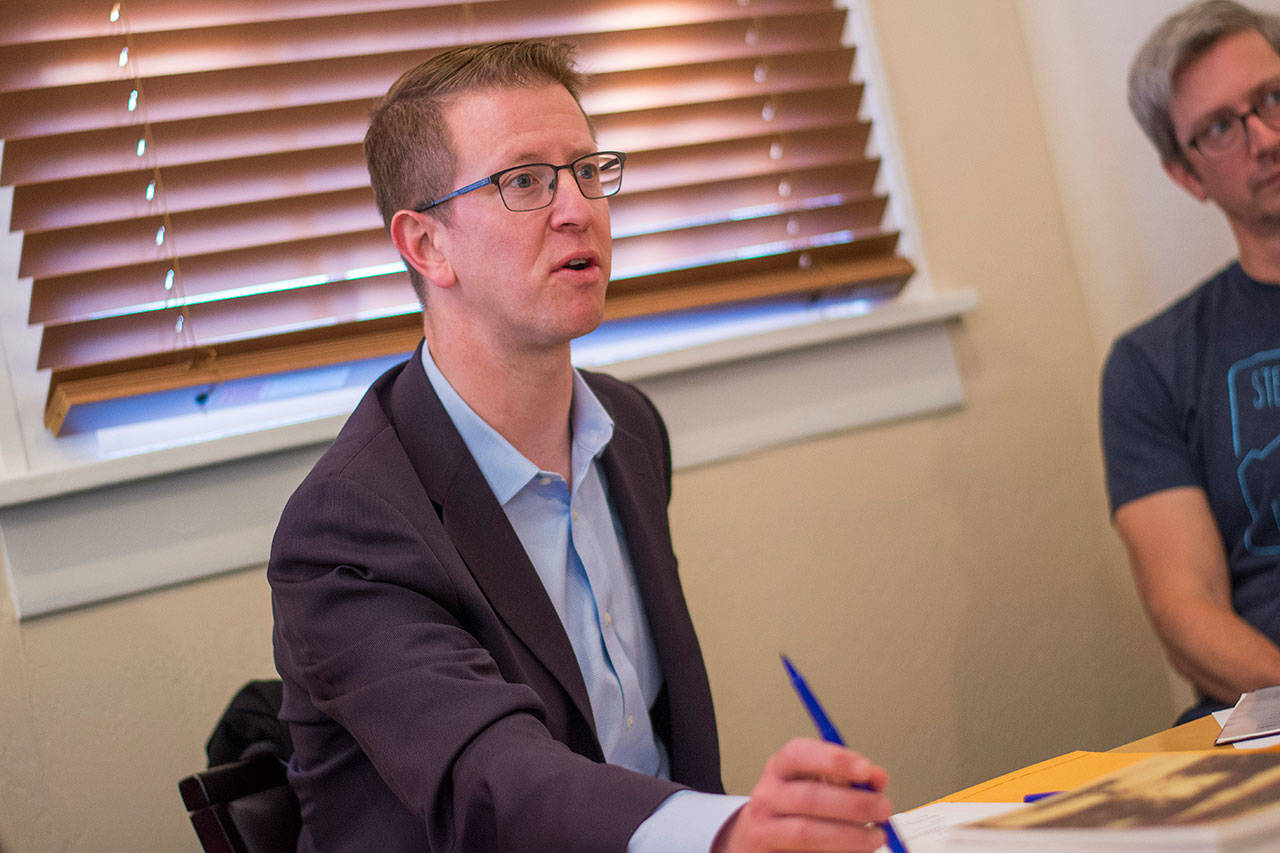PORT ANGELES — The partial government shutdown has now prevented access to Hurricane Ridge for 24 days, leaving members of the Hurricane Ridge Winter Sports Club worried about how the lost revenue could affect what’s left of the season.
Members of the Hurricane Ridge Winter Sports Club board met with U.S. Rep. Derek Kilmer, D-Gig Harbor, on Saturday morning, telling the Port Angeles-raised Democrat that the shutdown has caused an at least $50,000 loss in revenue.
“We will scramble and figure out how to do this one way or another, but it will take some creativity on our part,” said Roger Oakes, secretary of the club’s board. “We’ve survived before and we fully plan on surviving this time.”
The first thing Kilmer told the group during the Saturday morning meeting at the Port Angeles Visitor Center is that government shutdowns are “stupid” and that he had no idea when the shutdown would be over.
“I’m trying to make sure folks in Washington, D.C., understand this is not a cost-less exercise, that people are actually impacted by this,” Kilmer said. “It’s helpful for me to get ammo from you guys to help me make the case for ending this shutdown.”
Oakes told Kilmer the club has operated the Hurricane Ridge Ski Area — one of only three ski areas inside a national park — for 60 years, but with no end in sight for the government shutdown he doesn’t know whether the ski area will open this year.
“This is our 61st year — if we open,” Oakes said.
Keeping the Hurricane Ridge Ski Area open is typically a break-even operation that costs about $130,000 per year, Oakes said.
About half of that goes toward paying people to operate the lifts, paying people to sell tickets and for fuel.
The other half, about $64,000, is spent on insurance, permits, repairs, maintenance, setting up and marketing, all of which are expenses that are paid regardless of whether the ski area is open.
Oakes said that due to the first 40 percent of the season being lost to the shutdown — the most profitable part of the year — the ski club expect to lose $50,000 in revenue from ticket sales, season pass sales and the ski school.
“That’s a best-case scenario if we open this weekend,” Oakes said. “We’ve lost 40 percent of our season already. The spin off of that is people don’t buy season passes and people don’t sign up for ski school, so it’s an impact that will affect us throughout the year.”
Because it’s a break-even operation, the club has no reserve. Oakes said the club has an education foundation that has money, but that money can only be used on specific things.
“We can’t just put it into operations,” he said. “We’ll be in a pickle.”
Oakes said the club will likely need to fundraise in order to reopen the ski area next year. He said he is confident the Hurricane Ridge Winter Sports Club will survive, but doing so will require “creativity.”
Kilmer asked whether there is something Congress can do — in addition to reopening the government — that could help the club financially.
As an example, Kilmer cited a bill that provides protection for federal workers against foreclosure, eviction and default on financial obligations.
Kilmer asked about what insurance options are available for the club in the event it is unable to open for various reasons.
Members said there are insurance options this year for road closure and a new option for government shutdowns.
Kilmer said it’s “depressing” that there’s a product to help hedge against government shutdowns.
As the meeting continued, the conversation shifted to frustration about Congress’ inability to pass a budget, despite the House approving a budget bill identical to one passed in recent weeks by the Senate.
“These aren’t bills loaded up with Democratic poison pills,” Kilmer said. “These were Republican bills that were negotiated in the Senate.”
He said that initially he believed the shutdown would be brief, considering that the House and Senate passed bills with broad bipartisan support.
“I think there’s been a failure by the Senate to take action and there’s real consequences of that inaction,” Kilmer said. “It’s absolutely hurting the folks in this room and it’s hurting our community.”
Kilmer told the group he supports investments in border security. Kilmer co-sponsored the USA Act last year, which would have provided funding for technology, such as sensor and drone technology, to be used along the border.
Kilmer said he believes there is a legitimate debate to be had about how best to address border security, but he believes that discussion needs to happen while the government is open.
“We just came out of a period of united government where Republicans controlled the House, the Senate and the White House,” Kilmer said. “If building a wall was that big of a priority, you would think we would have voted on that under that united government, but now we’re in a government shutdown as a consequence of that issue.”
________
Reporter Jesse Major can be reached at 360-452-2345, ext. 56250, or at jmajor@peninsuladailynews.com.

